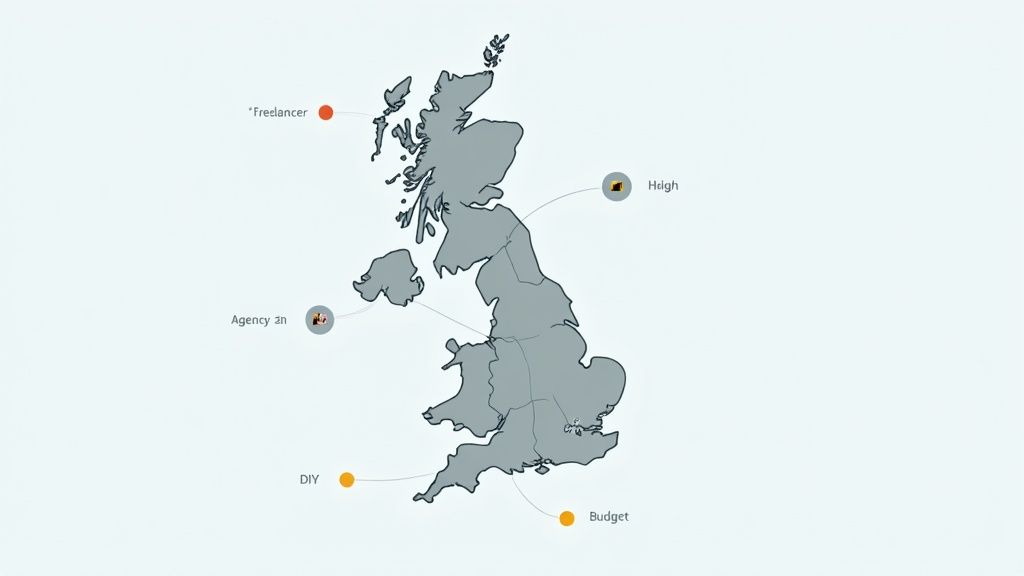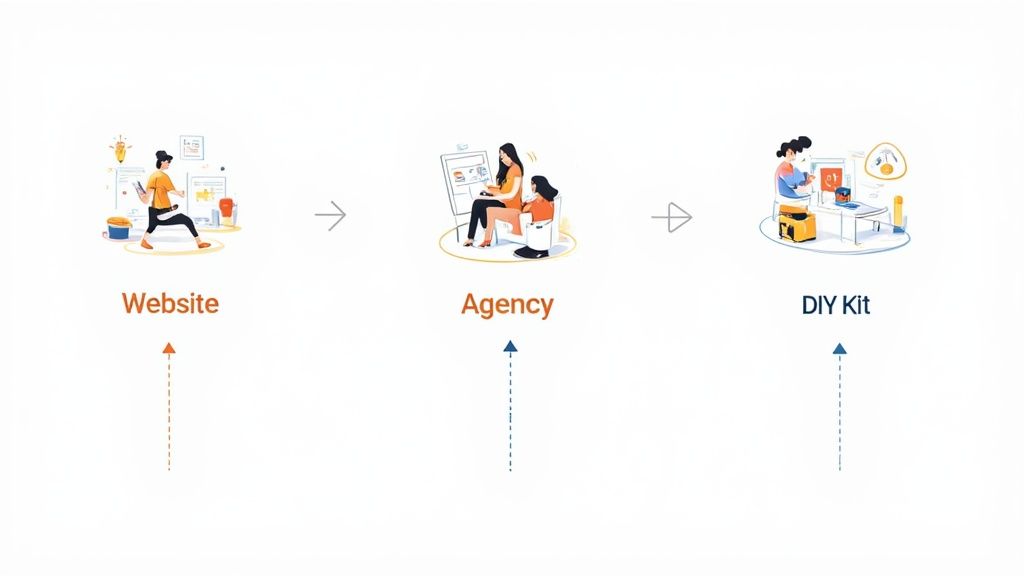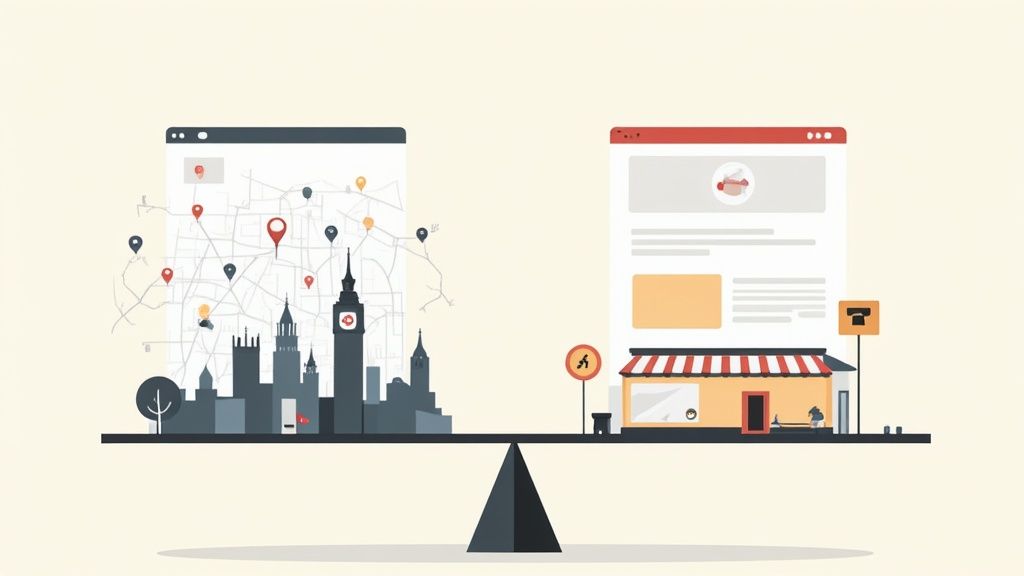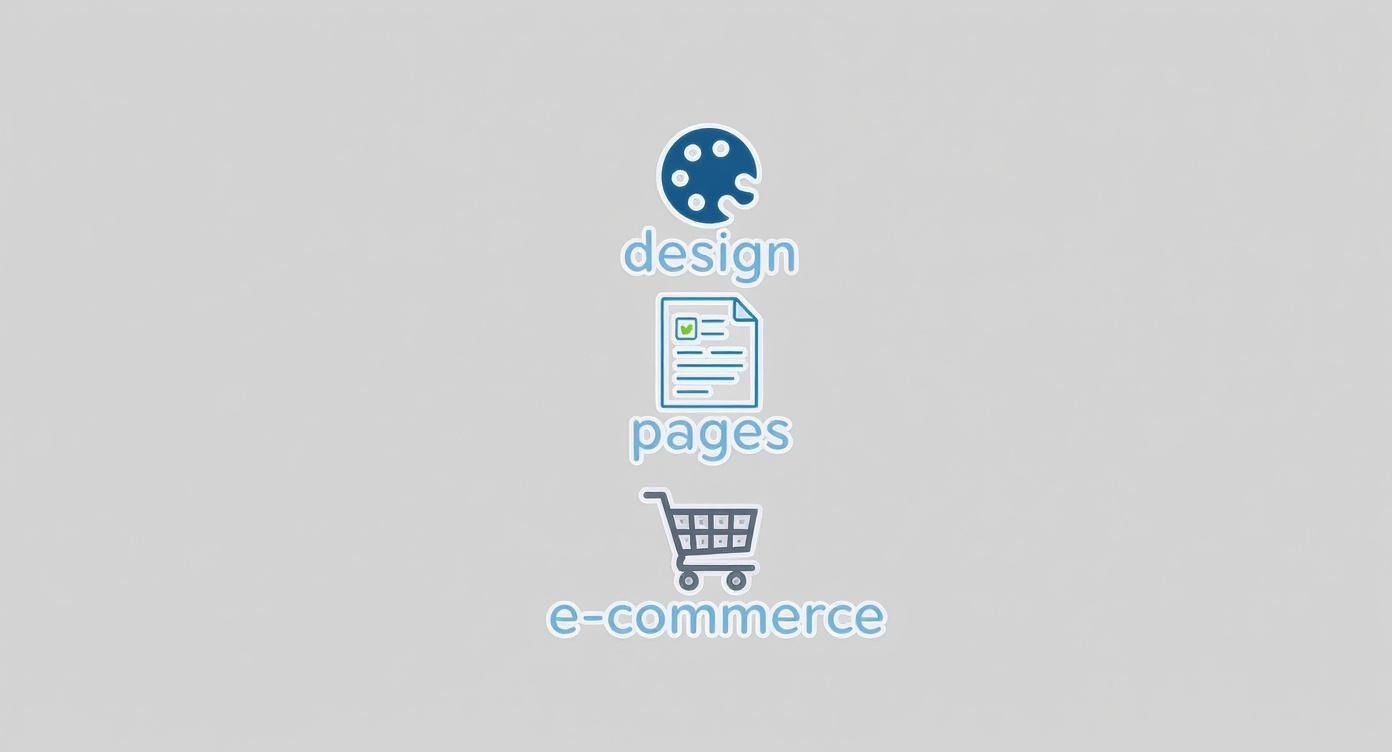
Trying to pin down the cost of web page design in the UK can feel a bit like asking, "How long is a piece of string?" Prices swing wildly, from a few hundred pounds for a simple job with a freelancer to well over £7,500 for a complex site built by a design agency.
The final number all comes down to the size of your project, the features you need, and just how much custom work is involved.
Your Quick Guide to UK Web Page Design Costs

Before we get into the nitty-gritty, it helps to have a high-level view of the landscape. Think of it like buying a car. A basic runaround will get you from A to B, but it has a very different price tag to a custom-built sports car packed with high-tech features. It’s exactly the same with web design.
This section gives you a straightforward summary of the kind of price ranges you can expect to see in the UK. We'll map out what your money typically gets you, whether you’re a solo entrepreneur after a simple portfolio or a growing business launching a full-scale online shop.
Typical UK Web Page Design Cost by Project Type
To give you an even clearer idea of how much a web page design cost might be, the table below breaks down common project types and their typical price brackets. This should help you quickly see where your own project might land.
| Website Type | Typical Price Range (£) | Best For |
|---|---|---|
| Simple Brochure/Portfolio Site | £300 – £1,500 | Freelancers, artists, or startups needing a basic online presence. |
| Small Business Website | £800 – £2,500 | Service-based businesses needing lead generation and a content management system (CMS). |
| Small E-commerce Store | £1,500 – £3,000 | Retailers starting with a small inventory and standard payment processing needs. |
| Corporate/Bespoke Platform | £3,000 – £7,500+ | Established companies requiring advanced features, integrations, and scalability. |
This table provides a great starting point for budgeting, but remember these are just ballpark figures.
The key is to look beyond the initial price and consider what's included. A higher up-front cost that covers strategy, SEO foundations, and future scalability often delivers far greater long-term value than the cheapest quote.
Based on data from UK service providers, a freelancer-built site can start as low as £300. More commonly, lead generation sites with CRM integration often fall between £1,500 and £2,500. Small e-commerce stores are generally priced from £1,500 to £3,000, but these figures can climb quickly with added services like copywriting and mobile optimisation.
It's also crucial to remember that the cost of hosting your website is a separate but essential ongoing expense. By understanding these different tiers and ongoing costs, you can align your budget with realistic outcomes and avoid any nasty surprises down the line. You can explore more insights about UK web design pricing on websitedesigninlondon.com.
Choosing Your Path: Freelancer vs Agency vs DIY

Sorting out your budget is one thing, but figuring out who will actually build your website is a huge decision. This choice has a direct knock-on effect on the final cost, the process, and what you end up with. You’ve basically got three main routes to choose from, and each one comes with its own price tag and set of trade-offs.
Think of it like getting a new kitchen fitted. You could hire a skilled solo tradesperson (a freelancer), bring in a full-service design and build firm (an agency), or head to IKEA and tackle the flat-pack yourself (DIY). All three paths get you a kitchen, but the cost, quality, and your own involvement will be worlds apart.
The Freelancer Route: A Personal Touch
Hiring a freelancer is like working with that skilled solo tradesperson. You get a direct, one-to-one relationship, which usually means a more personalised service and a bit more flexibility along the way. Because they have much lower overheads than a big agency, a freelancer can often deliver a professional website at a more accessible price.
This path is a fantastic fit for small businesses, start-ups, or projects with a clear, straightforward scope. If you're considering this, it's worth getting your head around the general best practices for freelance hiring. The main trade-off? A single person can only do so much. For really complex projects that need a whole team of different specialists, a freelancer might not have the bandwidth.
The Agency Approach: A Team of Specialists
Going with a web design agency is like hiring the full construction crew. You're not just getting one person; you get access to a whole team of specialists—designers, developers, SEO experts, copywriters, and project managers—all collaborating on your website. This approach is perfect for bigger, more complex builds, like a bespoke e-commerce platform or a corporate site with custom software integrations.
An agency brings a structured process, robust ongoing support, and a much broader skillset to the table. Of course, that comprehensive, all-in-one service comes with a higher price tag, making it a better fit for established businesses with a larger budget and ambitious plans for growth.
The crucial difference comes down to scale and resources. A freelancer offers focused, personal expertise, while an agency provides a multi-disciplinary team ready to handle every single part of a large-scale digital project, from initial strategy to launch and beyond.
The DIY Builder: The Budget-Friendly Option
Finally, there's the do-it-yourself (DIY) route—your flat-pack kitchen option. Using platforms like Wix, Squarespace, or Shopify lets you build a website yourself with minimal upfront cost, which is a massive draw for anyone on a really tight budget. These platforms work on a monthly subscription model and provide templates that can get you online fast.
But this path has some serious trade-offs. The initial cost looks tempting, with platforms charging anywhere from £9–£25/month for a standard site or £19–£259/month for an e-commerce setup with Shopify. While the starting price is low, these builders often lack the custom code and deep optimisation needed for strong SEO, which can seriously hamper your ability to get found on Google.
As your business grows, you might find their limitations on functionality and scalability become a real roadblock, forcing you into a costly and complicated redesign down the line.
Deciding which path to take really boils down to your budget, your technical confidence, and your long-term business goals. For those who want a professional result without the agency price tag, looking into options for an affordable small business website can offer a brilliant middle ground.
Understanding the Key Factors in Your Final Quote

When a web design quote lands in your inbox, it’s not just some number pulled out of thin air. Think of it more like a recipe, where every single ingredient contributes to the final dish—and its price. Several key factors directly influence how much a web page design cost will be, and getting your head around them is the first step to setting a realistic budget.
Let's break down the most significant cost drivers so you can see exactly where your investment is going. Knowing this stuff helps you have a much more informed, productive conversation with any designer or agency you talk to.
Number of Pages and Design Complexity
The most straightforward factor is simply the size of your website. A clean, five-page brochure site will naturally cost less than a sprawling fifty-page corporate platform. Why? Because it takes less time to design, build, and optimise each page.
But it's not just about the number of pages; design complexity is a massive variable. A website built from a pre-made template is like buying a suit off the peg—it's quick and cost-effective, but it might not be a perfect fit. A fully bespoke site, on the other hand, is the equivalent of getting a suit tailored. It’s crafted from scratch to perfectly match your brand's unique style and needs, which naturally comes at a higher price.
A crucial factor influencing your web design quote is a clear understanding of your target audience, as this dictates the design complexity and features required. Discover more about identifying your target audience to refine your project's scope.
Functionality and Custom Features
What does your website actually need to do? This is where costs can really start to vary. A static website that just displays information is one thing, but as soon as you add interactive features, you introduce a whole new layer of complexity.
Here are a few common features that will definitely increase your final quote:
- E-commerce Functionality: If you want to sell online, you'll need product pages, a shopping basket, a secure checkout process, and payment gateway integration. This is one of the most significant cost additions.
- Booking or Appointment Systems: For service-based businesses, an integrated calendar that lets clients book appointments directly on your site is a game-changer, but it needs to be built properly.
- Membership Portals: Creating exclusive content areas for registered members requires user authentication, account management, and different access levels.
- Custom Integrations: Need your site to talk to other software you use, like a CRM or an email marketing platform? That requires specialised development work to connect the dots.
These features demand sophisticated backend development, thorough testing, and ongoing maintenance, all of which contribute to the overall project cost. The entire journey is a detailed one; you can learn more about the complete web design process in our guide.
Overlooked and Ongoing Costs
Finally, it’s vital to look beyond the initial build. So many first-time website owners get caught out by the "hidden" costs that aren't always itemised in a basic quote but are crucial for a successful launch and long-term performance.
Make sure you ask if your quote includes these critical services:
- Copywriting: Professionally written content that’s optimised for both your customers and for search engines.
- Professional Photography: High-quality, original images make a world of difference compared to generic stock photos.
- Initial SEO Setup: Ensuring your site is built on a solid foundation so Google can find and rank it from day one.
- Ongoing Maintenance: Keeping your website secure, updated, and running smoothly long after it goes live.
Factoring these elements into your budget from the very beginning prevents nasty surprises down the line and ensures your new website has everything it needs to succeed right out of the gate.
How Location and Complexity Shape UK Web Design Prices
Not all websites are created equal, and their price tags definitely reflect that. Just as a flat in central London costs a world more than one in a smaller town, the real answer to "how much does a web page design cost?" is massively influenced by geography and just how fiddly the project is.
It’s no surprise that a feature-packed corporate website for a firm in a major city will command a higher price than a simple brochure site for a local business somewhere quieter.
In the UK, web design pricing can vary quite a bit from region to region, mostly driven by differences in the cost of living and general business overheads. You'll almost always find that agency rates in major hubs like London and Manchester are higher than in smaller towns. Professionals in these competitive city centres simply have higher running costs, and that naturally finds its way into their quotes.
Breaking Down Costs by Complexity
Beyond your postcode, the single biggest thing that drives the cost up or down is complexity. A website isn't a single, off-the-shelf product; it's a collection of features, pages, and code all working together. The more sophisticated these moving parts are, the more time and expertise it takes to build them.
We can generally group websites into four clear tiers based on how complex they are:
- Basic Brochure Sites: Think of these as a digital business card. They're simple, often built from a template, and usually have just 3-5 pages. Perfect for startups or individuals, they typically cost between £500 and £1,500.
- Standard Small Business Sites: This is a big step up, usually including a content management system (CMS) like WordPress and some custom design work. Ranging from £1,500 to £5,000, they’re built to generate leads and often include some foundational SEO.
- Mid-Range E-commerce Platforms: For any business selling online, these sites are a must. They need payment gateways, product management systems, and secure checkouts. Expect to pay anywhere from £2,000 to over £10,000, depending on how many products you have and what custom features you need.
- Bespoke Enterprise Solutions: These are the big, custom-built websites with unique functions, complex software integrations, and features coded from scratch. They command the highest prices, typically starting at £10,000 and climbing to £30,000 or more.
This infographic gives you a quick visual breakdown of the core elements that add to a project's complexity.

As you can see, even basic design choices, the total number of pages, and the need for e-commerce create a kind of cost hierarchy, with each layer stacking on top of the last.
Understanding these tiers is crucial for setting a realistic budget. It allows you to accurately place your project on the spectrum and align your investment with the level of functionality your business truly needs to succeed.
By knowing roughly where your project fits, you can have a much more informed chat with potential designers. For instance, businesses looking for expert guidance can learn more about professional web design in Glasgow to see how local specialists approach projects of different sizes. This helps make sure your final quote is a fair reflection of the work required.
How to Budget for Your Web Design Project
Figuring out a budget for your web design project can feel a bit like staring into the abyss, but with a clear strategy, you can get it right and avoid any nasty surprises down the road. Think of it like drawing up a blueprint before you start building a house. A solid plan ensures you're putting your money in the right places to get the best possible outcome for your business.
The very first step, before you even think about asking for quotes, is to nail down your project scope with absolute clarity. Get a document together that outlines exactly what you need. How many pages are we talking about? What specific features are completely non-negotiable? Who’s on the hook for providing the content and images? A detailed brief like this helps designers give you a truly accurate quote, and it’s your best defence against "scope creep"—that slow, sneaky addition of new features that always inflates the final bill.
Prioritise Your Must-Haves
Once you’ve got your scope defined, it’s time to get ruthless and separate your ‘must-haves’ from your ‘nice-to-haves’. Every single feature adds to the final answer of how much a web page design cost will be, so being strict with your priorities is key. For an e-commerce site, a secure and seamless checkout is a definite must-have. That complex, flashy animation on the homepage? That might be a nice-to-have that can wait for a future update.
A great way to manage this is to think in phases. Launch your site with the core, essential features that are going to deliver immediate value. You can always budget for the shiny enhancements and extra bells and whistles in a second or third phase as your business grows and starts generating revenue.
Plan for Ongoing Expenses
This is a classic mistake: focusing only on the upfront build cost. Your website is a long-term asset, not a one-off purchase, and it comes with ongoing running costs that need to be factored into your budget from day one. These aren't hidden fees; they are the essential costs of keeping your site healthy, secure, and working hard for you.
Key ongoing costs to budget for include:
- Web Hosting: The monthly or annual fee for the server space where your website files live.
- Domain Name Renewal: The yearly fee you pay to keep your website address.
- Maintenance and Support: This covers vital software updates, security scans, and bug fixes. You can learn more about what this involves in our guide to website maintenance and support.
Finally, when you start getting quotes in, don't just automatically jump at the lowest price. A suspiciously cheap quote can be a massive red flag. It often signals a generic, template-based design with little to no customisation or, even worse, hidden costs that will bite you later. Ask questions, make sure you understand exactly what's included, and choose a partner who offers transparent pricing and a clear plan for your success.
Common Questions About Web Page Design Costs
Even with a good grasp of the basics, a few specific questions about website design costs always seem to pop up. Let's tackle those common queries head-on, giving you the final pieces of the puzzle so you can move forward with confidence.
What Are the Typical Ongoing Costs After My Website Is Built?
This is a big one. It’s a common mistake to only budget for the initial build, but a website is a bit like a car; it needs fuel and regular servicing to keep running smoothly. Your key ongoing costs are essential for performance, security, and the long-term health of your investment.
These recurring expenses typically break down into a few key areas:
- Web Hosting: Think of this as the rent for your website's plot of land on the internet. For a small business, you can expect to pay between £5 and £25 per month for reliable shared hosting.
- Domain Name Renewal: This is your website's address (your .co.uk or .com). It needs to be renewed every year, usually costing around £10 to £20 annually.
- Maintenance Plans: Honestly, this is crucial. A good maintenance package covers software updates, security scans, and backups, which prevents hacks and performance nightmares. These often range from £30 to £100 per month.
- Premium Plugin/Software Licences: If your site uses paid plugins for special features like e-commerce or bookings, their licences will need renewing each year to keep working properly.
Factoring these into your budget from day one is the smartest move you can make. It ensures your investment stays protected and functional long after launch day.
How Much Do SEO and Copywriting Add to the Total Cost?
While some website quotes might bundle in some basic on-page SEO, comprehensive search engine optimisation and professional copywriting are almost always separate, specialised services. They aren't just optional add-ons; they are critical investments in your website’s ability to actually attract visitors and turn them into customers.
Think of it this way: a beautifully designed website is an empty shop. SEO is the signposting that brings customers to your door, and copywriting is the expert salesperson who convinces them to buy.
Here’s a rough idea of what to budget for these essentials:
- Professional Copywriting: For your core website pages (like Home, About, and Services), costs can range from £75 to £300 per page, depending on the writer's experience and the depth of research needed.
- Initial SEO Setup: A one-off setup to get your site technically sound and optimised for launch can cost anywhere from £500 to over £2,000.
- Ongoing SEO Services: To continuously improve your rankings, monthly retainers are the norm. These typically start at £500 per month and go up based on how competitive your industry is.
Is It Cheaper to Redesign an Old Site or Build a New One?
Ah, the classic dilemma. And the honest answer is almost always: it depends on the foundations. If your current website is built on an outdated platform, uses old code, or has fundamental structural problems, trying to patch it up can be like renovating a house with a crumbling foundation. It quickly becomes a false economy.
In many cases, starting fresh is actually more cost-effective in the long run. A new build ensures your site uses modern, secure code, is fully mobile-responsive from the ground up, and is built on a solid SEO framework. A redesign might seem cheaper at first glance, but you could easily spend more money fighting with old limitations than you would on a clean, new build.
Ready to build a website that not only looks incredible but also delivers real business results? At Altitude Design, we create custom, high-performance websites with transparent, fixed-price packages. Get your instant quote today!